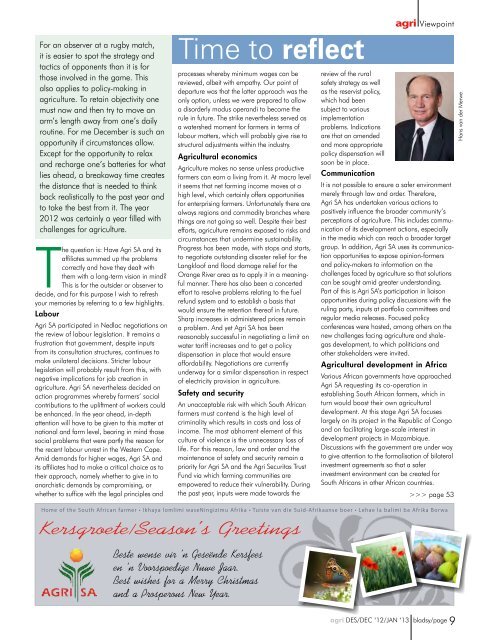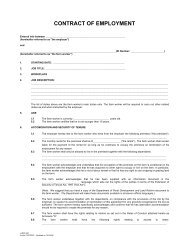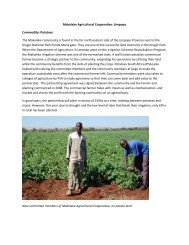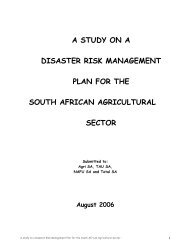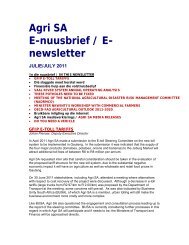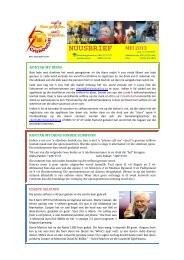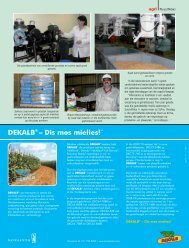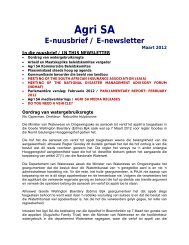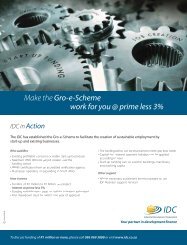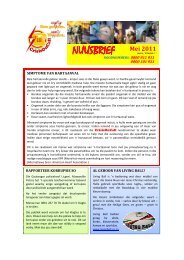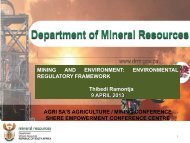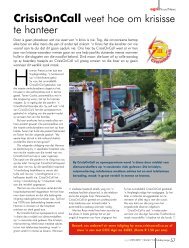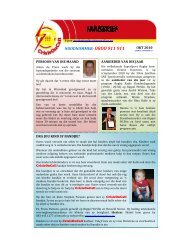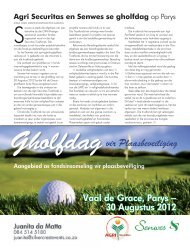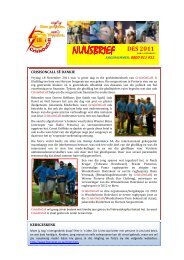Home of Agriculture
Home of Agriculture
Home of Agriculture
Create successful ePaper yourself
Turn your PDF publications into a flip-book with our unique Google optimized e-Paper software.
For an observer at a rugby match,<br />
it is easier to spot the strategy and<br />
tactics <strong>of</strong> opponents than it is for<br />
those involved in the game. This<br />
also applies to policy-making in<br />
agriculture. To retain objectivity one<br />
must now and then try to move an<br />
arm’s length away from one’s daily<br />
routine. For me December is such an<br />
opportunity if circumstances allow.<br />
Except for the opportunity to relax<br />
and recharge one’s batteries for what<br />
lies ahead, a breakaway time creates<br />
the distance that is needed to think<br />
back realistically to the past year and<br />
to take the best from it. The year<br />
2012 was certainly a year filled with<br />
challenges for agriculture.<br />
The question is: Have Agri SA and its<br />
affiliates summed up the problems<br />
correctly and have they dealt with<br />
them with a long-term vision in mind?<br />
This is for the outsider or observer to<br />
decide, and for this purpose I wish to refresh<br />
your memories by referring to a few highlights.<br />
Labour<br />
Agri SA participated in Nedlac negotiations on<br />
the review <strong>of</strong> labour legislation. It remains a<br />
frustration that government, despite inputs<br />
from its consultation structures, continues to<br />
make unilateral decisions. Stricter labour<br />
legislation will probably result from this, with<br />
negative implications for job creation in<br />
agriculture. Agri SA nevertheless decided on<br />
action programmes whereby farmers’ social<br />
contributions to the upliftment <strong>of</strong> workers could<br />
be enhanced. In the year ahead, in-depth<br />
attention will have to be given to this matter at<br />
national and farm level, bearing in mind those<br />
social problems that were partly the reason for<br />
the recent labour unrest in the Western Cape.<br />
Amid demands for higher wages, Agri SA and<br />
its affiliates had to make a critical choice as to<br />
their approach, namely whether to give in to<br />
anarchistic demands by compromising, or<br />
whether to suffice with the legal principles and<br />
Time to reflect<br />
processes whereby minimum wages can be<br />
reviewed, albeit with empathy. Our point <strong>of</strong><br />
departure was that the latter approach was the<br />
only option, unless we were prepared to allow<br />
a disorderly modus operandi to become the<br />
rule in future. The strike nevertheless served as<br />
a watershed moment for farmers in terms <strong>of</strong><br />
labour matters, which will probably give rise to<br />
structural adjustments within the industry.<br />
Agricultural economics<br />
<strong>Agriculture</strong> makes no sense unless productive<br />
farmers can earn a living from it. At macro level<br />
it seems that net farming income moves at a<br />
high level, which certainly <strong>of</strong>fers opportunities<br />
for enterprising farmers. Unfortunately there are<br />
always regions and commodity branches where<br />
things are not going so well. Despite their best<br />
efforts, agriculture remains exposed to risks and<br />
circumstances that undermine sustainability.<br />
Progress has been made, with stops and starts,<br />
to negotiate outstanding disaster relief for the<br />
Langklo<strong>of</strong> and flood damage relief for the<br />
Orange River area as to apply it in a meaningful<br />
manner. There has also been a concerted<br />
effort to resolve problems relating to the fuel<br />
refund system and to establish a basis that<br />
would ensure the retention there<strong>of</strong> in future.<br />
Sharp increases in administered prices remain<br />
a problem. And yet Agri SA has been<br />
reasonably successful in negotiating a limit on<br />
water tariff increases and to get a policy<br />
dispensation in place that would ensure<br />
affordability. Negotiations are currently<br />
underway for a similar dispensation in respect<br />
<strong>of</strong> electricity provision in agriculture.<br />
Safety and security<br />
An unacceptable risk with which South African<br />
farmers must contend is the high level <strong>of</strong><br />
criminality which results in costs and loss <strong>of</strong><br />
income. The most abhorrent element <strong>of</strong> this<br />
culture <strong>of</strong> violence is the unnecessary loss <strong>of</strong><br />
life. For this reason, law and order and the<br />
maintenance <strong>of</strong> safety and security remain a<br />
priority for Agri SA and the Agri Securitas Trust<br />
Fund via which farming communities are<br />
empowered to reduce their vulnerability. During<br />
the past year, inputs were made towards the<br />
agri Viewpoint<br />
review <strong>of</strong> the rural<br />
safety strategy as well<br />
as the reservist policy,<br />
which had been<br />
subject to various<br />
implementation<br />
problems. Indications<br />
are that an amended<br />
and more appropriate<br />
policy dispensation will<br />
soon be in place.<br />
Communication<br />
It is not possible to ensure a safer environment<br />
merely through law and order. Therefore,<br />
Agri SA has undertaken various actions to<br />
positively influence the broader community’s<br />
perceptions <strong>of</strong> agriculture. This includes communication<br />
<strong>of</strong> its development actions, especially<br />
in the media which can reach a broader target<br />
group. In addition, Agri SA uses its communication<br />
opportunities to expose opinion-formers<br />
and policy-makers to information on the<br />
challenges faced by agriculture so that solutions<br />
can be sought amid greater understanding.<br />
Part <strong>of</strong> this is Agri SA’s participation in liaison<br />
opportunities during policy discussions with the<br />
ruling party, inputs at portfolio committees and<br />
regular media releases. Focused policy<br />
conferences were hosted, among others on the<br />
new challenges facing agriculture and shalegas<br />
development, to which politicians and<br />
other stakeholders were invited.<br />
Agricultural development in Africa<br />
Various African governments have approached<br />
Agri SA requesting its co-operation in<br />
establishing South African farmers, which in<br />
turn would boost their own agricultural<br />
development. At this stage Agri SA focuses<br />
largely on its project in the Republic <strong>of</strong> Congo<br />
and on facilitating large-scale interest in<br />
development projects in Mozambique.<br />
Discussions with the government are under way<br />
to give attention to the formalisation <strong>of</strong> bilateral<br />
investment agreements so that a safer<br />
investment environment can be created for<br />
South Africans in other African countries.<br />
>>> page 53<br />
Hans van der Merwe<br />
<strong>Home</strong> <strong>of</strong> the South African farmer • I k haya lomlimi waseN ingizimu Afrik a • Tuiste van die Suid-Afrik aanse boer • Lehae la balimi ba Afrik a Bor wa<br />
Kersgroete/Season’s Greetings<br />
Beste wense vir ‘n Geseënde Kersfees<br />
en ‘n Voorspoedige Nuwe Jaar.<br />
Best wishes for a Merry Christmas<br />
and a Prosperous New Year.<br />
agri DES/DEC ‘12/JAN ‘13 bladsy/page


